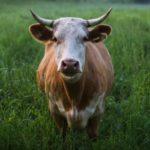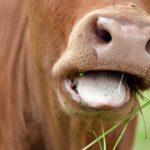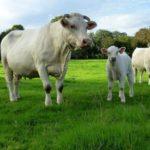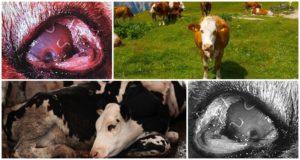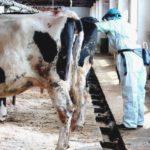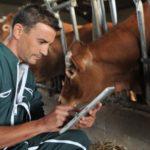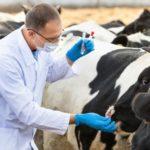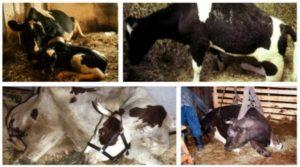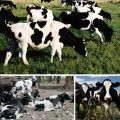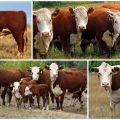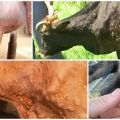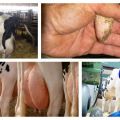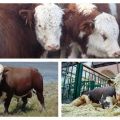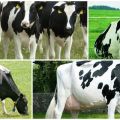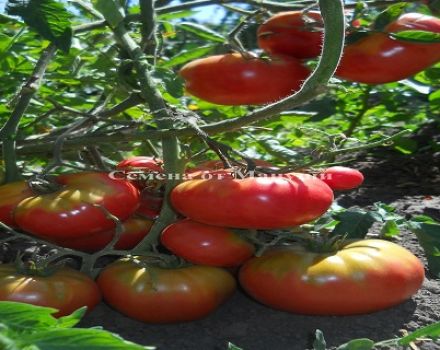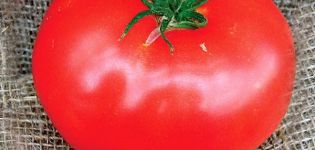Signs and symptoms of worms in cows and calves, treatment and prevention
When raising and breeding cows in industrial or private farms, livestock breeders may face some problems, for example, with the defeat of animals by helminthiases. The consequences of infection with worms in a cow are a decrease in productivity or, in some cases, the death of animals. Because of this, helminthiases can cause serious damage to any livestock farm.
Varieties of worms in cows
The worms that parasitize cows belong to different types and classes. But all of them in the process of vital activity release toxins, and they are carried through the body of the animal with blood. Substances provoke serious disorders and pathologies in many organs.
Echinococcosis
The disease is widespread, chronic. The causative agent is the larval echinococcus, which grows inside the cow's body for years and can reach sizes of 5-10 cm. Sexually mature echinococci parasitize in the small intestine of some carnivores, but dogs are considered the main distributors.
The eggs of the worms enter the cow's body with food and water, more often adults become infected.
The consequences of the disease are exhaustion, sometimes the death of animals, a decrease in productivity. Echinococcosis treatment has not been developed. Prevention consists in limiting contact of cows with dogs, preventing them from entering pastures and forage stores.
Dictyocaulosis
The causative agent of this disease, nematodes from the Dictyocaulidae family, parasitize in the lungs and bronchi of cows and other ruminants. Cows become infected in pastures by eating grass and at watering holes or through bedding. Nematodes parasitize the lungs and bronchi. Dictyocaulosis presents with symptoms similar to bronchitis or bronchopneumonia.
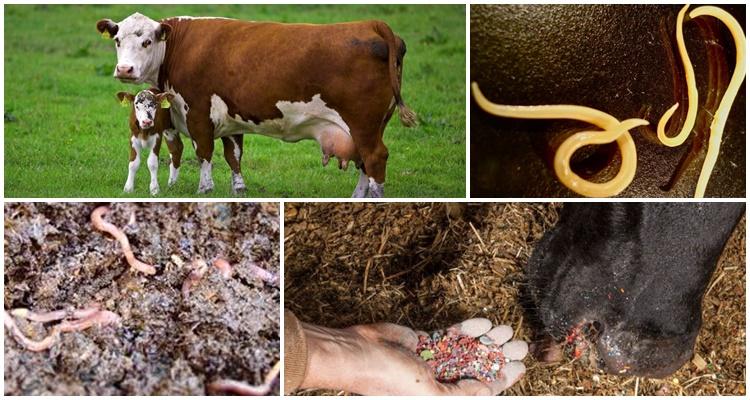
Sick cows lose weight, become depressed, lose their appetite, and the sinuses fill with mucus. If there is a blockage of the bronchi and trachea, the animal may die. For treatment, antihelminthic drugs are prescribed.
Telyaziosis
Disease caused by nematodes. Thelaziosis becomes active in the summer months, and flies spread the parasites. Helminths affect the eyes of cows, against the background of this, secondary infections are connected, as a result of which serious visual impairments are observed. Treatment is carried out with antiparasitic drugs.
Ascariasis
The disease is caused by roundworms, parasites of domestic animals and humans. Cows get sick with this disease everywhere, animals of all ages can get sick, but it is more severe in young individuals. The consequences of the disease can be exhaustion, pneumonia, hepatitis.It is difficult to destroy ascaris; anthelminths based on albendazole are used to combat them.
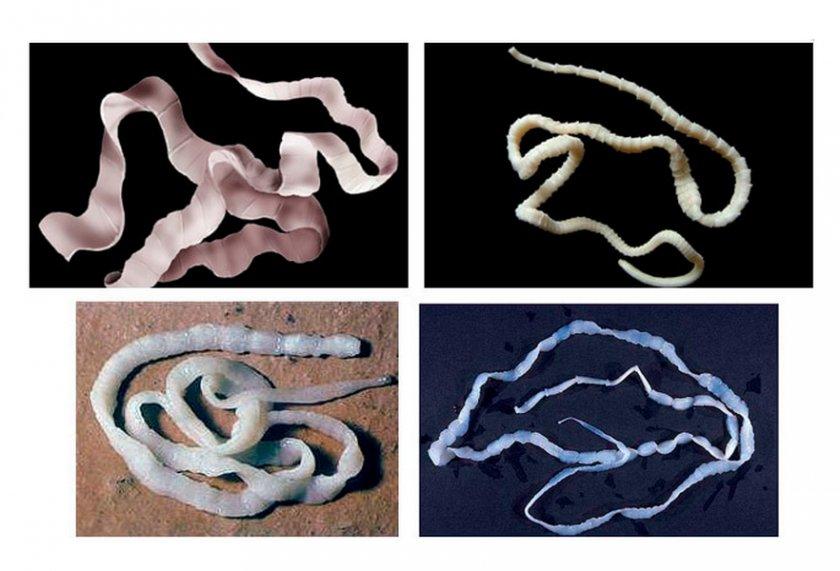
Moniezioz
Helminthiasis refers to cestodiasis, parasites infect the small intestine of ruminants. With a weak invasion, the symptoms of the disease manifest themselves weakly, with a strong one - the animals get sick seriously and often die. Moniesiasis can be almost asymptomatic, but in the chronic course, sick cows lag behind in growth, they have an increase in lymph nodes, anemic mucous membranes, and a decrease in productivity.
Combined treatment, several anthelmintic drugs are used.
Infection routes
Cows become infected with helminths by eating contaminated food or drinking water from open sources or in a barn containing eggs or larvae of parasites. They get there from the organisms of sick animals or carriers. The main routes by which infection occurs are through the digestive tract, through the skin, nose and eyes, through the bites of blood-sucking insects, with close contact of a sick individual with a healthy one.
Symptoms of the appearance of parasites
Determining that a cow is infected with helminths can be difficult, since the development of the disease may be asymptomatic or there are signs, but they resemble the symptoms of infectious diseases. Diagnostics will help to differentiate some pathologists from others.
Disorders of the gastrointestinal tract can be observed - diarrhea or, conversely, constipation, exhaustion, anemia, blanching of the mucous membranes, hair can lose shine or fall out, the quality of milk deteriorates.
Diagnostic measures
To diagnose helminthiasis, feces and blood of sick animals are examined. If the disease is detected in time and treatment is started, the worms are successfully excreted from the body of cows after anthelmintic treatment.
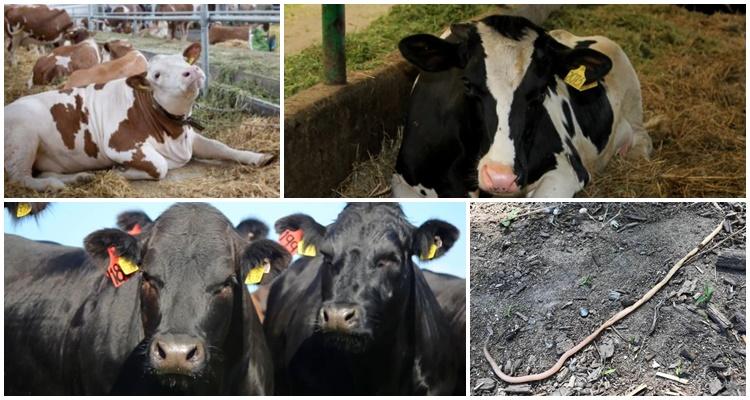
The diagnosis is made on the basis of laboratory data on feces and secretions from other organs and on the basis of the results of immunological reactions. Additionally, epizootological data and clinical symptoms are used in the diagnosis. For analysis, take feces, urine and sputum, bile, blood, muscle samples, pieces of skin, the contents of abscesses.
Cattle treatment rules
To get rid of worms, cows are prescribed a comprehensive treatment, in parallel with this, a thorough cleaning of the barn, equipment and disinfection is carried out. The food is examined and, if sources of infection are identified in it, destroyed. Also subject to research are pastures, water that cows drink. If worms are found there, the grazing and watering places are changed. Sick individuals are removed from the herd and kept separately during treatment.
Medication
The anthelmintic agents chosen for the treatment of adult cows and calves differ depending on the disease, since they are caused by different worms. Anthelmintic drugs destroy parasites and remove them from the body of cows. They are administered by mouth or by injection, subcutaneously. Some medicines are added to feed.
Doses of drugs depend on the weight of the animal. If the calf is very small, and worms are found in the cow, the baby is taken from her and kept separately until the mother is fully recovered.
Folk remedies and recipes
You can cure a cow from worms with pumpkin seeds, linseed oil, birch tar. Wormwood works well, which can be added to grass or hay, or you can drink animals with an infusion from this plant (take 300 g of dry wormwood for 2 liters of boiling water, leave for 2-3 hours, then dilute the resulting infusion in a ratio of 1 to 20).The following plants have antihelminthic properties: calamus, bracken, white hellebore, coriander, hazel, red quinoa, sage, hops, hemp, mountain ash, thyme, juniper. Grasses and branches can be fed to cows 2-3 times a week in small portions.
Potential hazard
Worms worsen the health of animals, they lose weight, that is, lose weight. In addition, the quality of milk and meat is deteriorating, with many helminthiases, the use of products from sick cows is prohibited, since helminths can be dangerous for humans. Do not use or feed animals, for example, dogs and cats, not only meat and dairy products, but also waste - skins, bones.
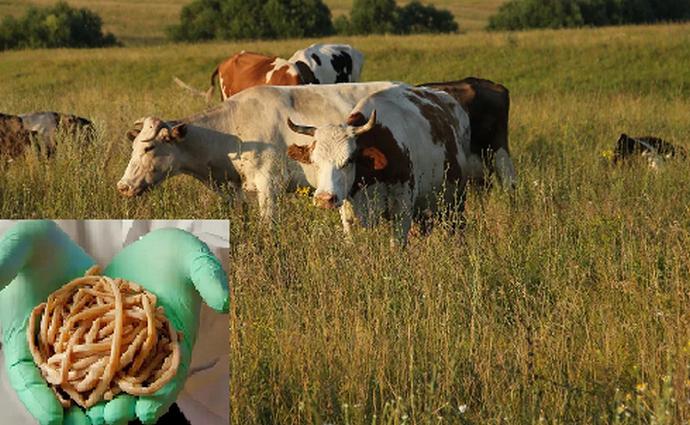
Preventive actions
When symptoms appear, treatment is indispensable, but it is much easier and more profitable from an economic point of view not to treat animals, but to organize the management of the economy so that diseases do not appear in it.
To reduce the likelihood of infection with helminths, all cows on the farm should be given anthelmintic drugs 2 times a year for prevention. Rooms where animals are located must be disinfected at least 2 times a year, and can be treated more often.
Also, at least 2 times a year, it is necessary to completely remove and change the litter, it should not be allowed that the animals eat up the food that has fallen to the floor, which in this way may already be infected with worm eggs. Change the water every day and monitor its quality. Change pastures, that is, do not graze cows in one place. It is advisable to keep calves separately from adult cows before scheduled treatments.
Helminthiases are dangerous because, without treatment, they lead to a decrease in the productivity of animals or even death. Compliance with the rules of caring for cows and carrying out preventive treatments will help prevent infection and the consequences that helminth diseases lead to.
